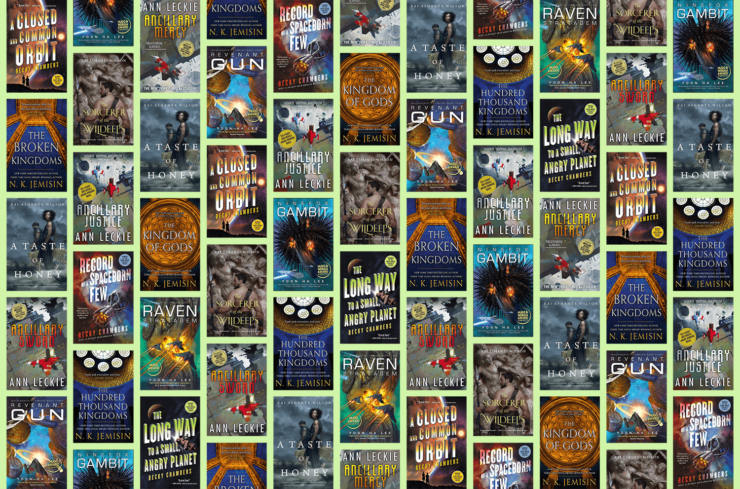I’ve had a couple of opportunities to write about whole series in this space before—for example, the four-post sets that discuss Maggie Stiefvater’s Raven Cycle and Laurie Marks’s Elemental Magic series in depth, or the longer run on “Reading Joanna Russ.” But what usually happens is something more along the lines of… I happen to review a book or two (or if we’re really lucky, each separate book in a series over several years of coverage!) in this space, on a pretty individual basis. Some of those were great and I reflect on them fondly, like Chris Moriarty’s Spin trilogy or Elizabeth Bear’s Jacob’s Ladder novels, but I can’t get to everything.
So, what better opportunity than our special retrospective month of QSFF am I going to have to talk about a handful of queer book series I either haven’t reviewed at all, haven’t considered as a coherent whole, or just want to give a nice solid “remember how cool this was” bump to? I can’t think of a more perfect moment. For several of these, my awesome colleagues wrote reviews at the time of publication, and in those cases I’ve included links too!
Machineries of Empire by Yoon Ha Lee
While I reviewed the collection Hexarchate Stories (2019), I never actually talked about the preceding trio of books that lit me absolutely on fire with how excellent they were: Ninefox Gambit, Raven Stratagem, and Revenant Gun (2016-2018). Ninefox Gambit won the Locus Award for Best First Novel and the following two were nominees for major awards like the Hugo. The protagonists of these books include folks like Kel Cheris, Kel Brezan, and Shuos Jedao—all of whom are also surrounded by a massive and diverse supporting cast. One of them, Jedao, starts off the series as a disembodied sort-of ghost that inhabits Cheris’s body, while later on in the narrative he’s given a form constructed out of the same stuff as their starships (who are, as it turns out, sentient), losing most of his memories in the process.
Two things struck me most about this series as a whole. On the one hand, there’s the deliciously pervasive fuckery with gender, relationship structures, the erotic, power dynamics, and what it means to be alive or to be considered a legitimate “being.” (Especially once we get to Revenant Gun!) Lee is a queer trans author; unsurprisingly, an engaging and inquisitive sensibility toward bodies, relationships, and the social comes through across all the books. Take the first novel, where Cheris and Jedao must share a body—their dynamic is fluidly complicated in terms of how gender and embodiment over time intersect. And yet, while the interpersonal stuff is obviously very neat, Lee doesn’t stop there: The Machineries of Empire features tricky, knife-edged plots set in a breathtakingly expansive world of maths that are universe-shaping, along with spycraft, domination, and war. There are factions, rivalries, and gruesome battles on unimaginable scales. Ethics are ugly, complicated, and perpetually in contest…which is exactly my kind of mess.
Buy the Book
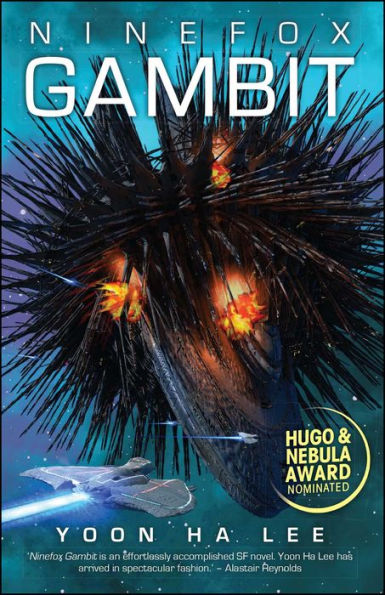

Ninefox Gambit
The Inheritance Trilogy by N. K. Jemisin
In hindsight, The Hundred Thousand Kingdoms (review by Kate Nepveu) was without question one of the decade’s best debut novels. But it was also the first of a trilogy of books which continued to be awesome, and presaged the sweeping grandeur of Jemisin’s more oft-discussed these days (since it’s more recent) Broken Earth novels. I wanted to take us back in time, though, to 2010/2011—when the talk was all about how original and sharp the Inheritance books were. All three novels were released within roughly a year of one another, and like dropping a boulder into a swimming pool, the resulting splash was refreshingly inescapable. I feel like folks who’ve come to Jemisin’s work via her most recent novels would be well served to take a trip back to this first trilogy, so this is my “remember how cool these are, seriously?” bump in the retrospective.
Queerness—in terms of gender and sexuality, bodies and connections—drives the Inheritance books. While the novels are about political succession, inequality, and imperialism, they are also about relationships and the individuals who drive large-scale social systems. After all, if under the excuse of jealousy and pride the god Itempas hadn’t murdered Enefa and imprisoned Nahadoth, none of the events of the novels would’ve been struck into motion in the first place. Nahadoth, with the transitions between genders undertaken during the books (among other aspects), stuck with me perhaps the most of the characters. I remember being delighted, too, by the contexts of the erotic both spiritual and physical experienced by protagonist Yeine with the gods and godlings. It’s a sprawling, sexy, cool series that I’d love to revisit again.
Buy the Book
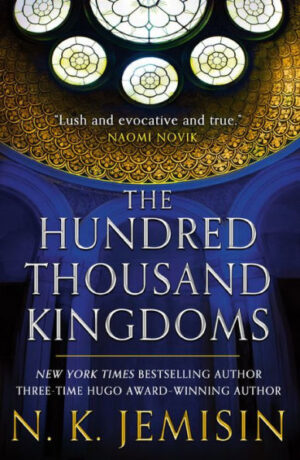

The Hundred Thousand Kingdoms
Imperial Radch by Ann Leckie
Otherwise referred to in conversation as the Ancillary books (Justice, Sword, Mercy), this trilogy ran from 2013-2015; in keeping with the rest of this list so far, the response was loud and delighted on original publication—but I never got to talk about these here! Liz Bourke also did an excellent essay in 2016 in addition to the linked reviews above—“The Politics of Justice: Identity and Empire in Ann Leckie’s Ancillary Trilogy”—which I totally recommend, but I want to get in on the action here for a minute, as well…
Here we have another set of books about the messiness of imperialism, this time posing questions about be-ing (for AI fragments, for people, for people who other people don’t think are really people, et cetera)… and it’s a swelling, intense, emotional masterpiece. As Liz said in all caps, Leckie stuck the landing with Ancillary Mercy. Also, it’s fundamentally very queer. The Radchaai monogender is a significant part of understanding ancillaries and the bodyminds (to steal an academic term I think works well for these books) created therein. Investigations of the social alongside the biological run through the whole trilogy at micro- and macro-levels, often with regards to gender, which balances well alongside a drama of power, empire, and interpersonal justice. I will say the use of “she” as non-gendered pronoun did (and still does) ping for me in weird ways, which are also discussed in depth here; the series as a whole is doing so much viscerally provocative stuff. To that end, using “she” in this way does lift some feminist weight, though perhaps a neutral pronoun would’ve done that differently (similarly to Le Guin and The Left Hand of Darkness).
Buy the Book
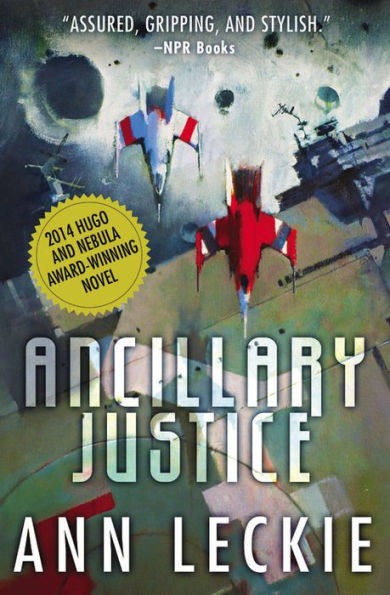

Ancillary Justice
Wayfarers by Becky Chambers
There are three books in the Wayfarers set: The Long Way to a Small, Angry Planet, A Closed and Common Orbit, and Record of a Spaceborn Few (original reviews by Niall Alexander). The tone of these books, though, is markedly different than the other three series I’ve discussed so far. The first novel was originally self-published before being picked up by a mainstream press; the following two have met with positive responses throughout the field. I recently reviewed a novella by Chambers (To Be Taught, If Fortunate) that is not part of the series but does hit similar notes, which points us toward the reason I enjoy these novels so much: the focus on domesticity and the communal.
While it goes without saying that Chambers’s series, featuring as it does a variety of types of beings whose genders and relationships are equally diverse, is queer… there’s something additional about them, in terms of queerness, that deserves mention: the focus on chosen families or even temporary assemblages of family. How characters relate to each other drives the books. Their crushes, their interests, their attractions and conflicts are often the source of movement in the narrative; the books aren’t totally without traditional plots, but those take the B-side rather than the A-side, generally. Put next to several series with huge, galactic wars, impossible stakes, and unresolvable questions about power, Chambers’s books show another side of queer SF—one that’s kind, quiet, thoughtful, and focused on how we might live with each other differently, to better ends than the ones we’ve currently got.
Buy the Book
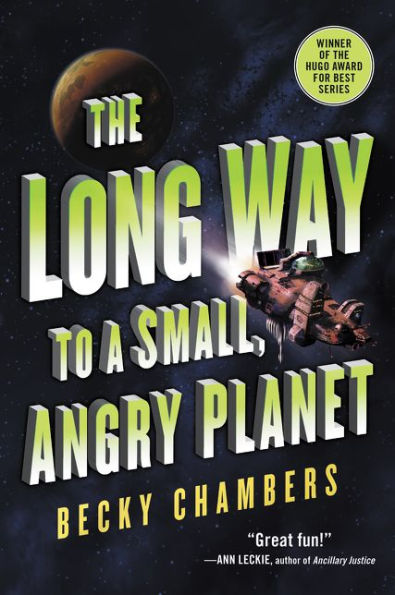

The Long Way to a Small, Angry Planet
The Wildeeps Novellas by Kai Ashante Wilson
The Sorcerer of the Wildeeps (2015) and A Taste of Honey (2016) are two of the most memorable novellas/short novels I’ve read in years, and Liz did an excellent job discussing them when they were first released. If you’ll recall, Wildeeps was also the first book in the launch of the Tor.com novella line, which set the tone for that ongoing publishing project in a direct way that I appreciate. Given the larger context, I hate to admit that somehow I actually didn’t get to them until very recently! But boy was I glad I did, once I arrived… Wilson’s short fiction is always top-notch, so I’m unsurprised at how stunning his novellas are in turn. Both books in the duet center on queer men of color, and both are elegantly constructed stories that draw from the tropes of sword-and-sorcery or science-fantasy.
Wildeeps (and its footnoting) constructs an air of conflict and potential tragedy. Demane and Isa often communicate past each other; their status as something-like-demigods speaking through constant translation and code-switching adds a layer of challenge to the whole interpersonal endeavor. Wildeeps is also an ambiguous and upsetting tale, in part focused on men’s lives isolated among other men. Honey, on the other hand, presents what initially appears to be tragedy in its nonlinear format. Aqib is a citizen of a nation that forbids relationships between men, but he falls in love with the visitor Lucrio over the course of ten whirlwind days…though in the future, he appears to be married to a woman, having given up this passion. The twist, when it comes, is a strong reversal of the usual story of poignant queer loss I thought we were heading toward (especially after having read Wildeeps). The pair of these novellas, linked together in their shared universe, do some deeply fresh and engaging work with genre tropes, language, and masculine attachments; I can’t wait to see if there’ll be more in the future.
Buy the Book
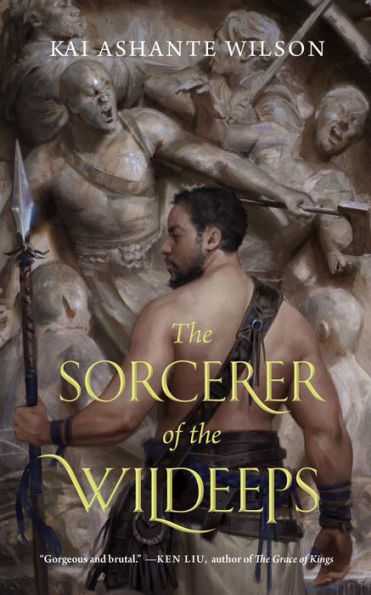

The Sorcerer of the Wildeeps
***
There are so, so many other series I still haven’t read, or that fall outside of the decade, or that I got to talk about here already but I still adore—not to mention those series that are still ongoing! A few of those “just started out” series are contenders to tackle top spots for me over the next ten years, like K. A. Doore’s Chronicles of Ghadid or Tamsyn Muir’s Locked Tomb trilogy. And this of course doesn’t take into account the books to come from a plethora of queer writers whose names I don’t know yet, whose work is still being written…more of which I hope to see from across the globe in the coming years—particularly as translated publications grow in accessibility and scale. But in terms of this retrospective look at the last ten years, I hope these series under discussion jog your memory of good reads past, provoke a bit of re-reading, and maybe give you the nudge to pick up something you might have missed at the time!
Lee Mandelo is a writer, critic, and editor whose primary fields of interest are speculative fiction and queer literature, especially when the two coincide. They have two books out, Beyond Binary: Genderqueer and Sexually Fluid Speculative Fiction and We Wuz Pushed: On Joanna Russ and Radical Truth-telling, and in the past have edited for publications like Strange Horizons Magazine. Other work has been featured in magazines such as Stone Telling, Clarkesworld, Apex, and Ideomancer.










